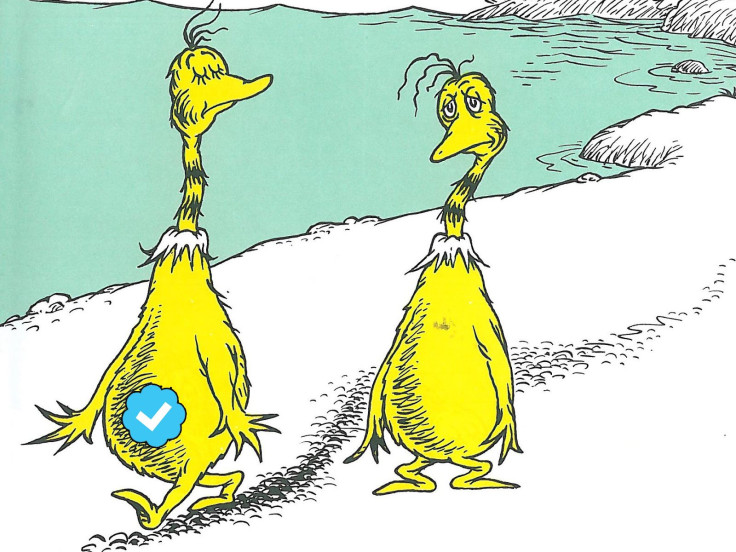Twitter Verified Badges Should Be Available To Every User

Twitter’s promise as an egalitarian media platform has always been dubious, but lately it seems as if the website is purposely fostering the kind of cyber snobbery that gives social media its occasionally well-deserved bad name. I’m talking about the shadowy and increasingly perplexing world of Twitter verification, the mysterious process by which the gatekeepers of Twitter Inc. (NYSE:TWTR) bestow upon certain privileged users a bright blue badge and corresponding white checkmark.
The program began earnestly enough in 2009, after a rogue Twitter user impersonated the manager of the St. Louis Cardinals with a phony account. Twitter responded by issuing the now-familiar badges to a select few accounts that it had deemed at high risk for attracting impersonators.
The concept was a good one and remains an undeniably useful visual cue for identifying the authentic accounts of celebrities and other high-profile figures and organizations. For instance, when Rupert Murdoch makes one of his trademark Twitter faux pas, we can say with relative certainty that the boneheaded comment du jour is coming from the real Rupe and not an impersonator.
But over the years, as Twitter has expanded and broadened its verification program to include arbitrary professionals in certain industries, its inconsistent methods have reeked of favoritism and bias. Most BuzzFeed reporters, even those with fewer followers, are verified. Ditto for the New York Post. And yet many top names at Gawker Media have yet to see a checkmark. It’s hard to imagine one of these organizations being more of a target for impersonation than another. Add to that stories of Twitter doling out verification badges to advertisers who pay more than $15,000 over three months -- however true or untrue such stories may be -- and it’s easy to imagine why a search of the @verified Twitter account reveals so many users begging and pleading for a badge.
But those pleas for validation add up to an obvious conclusion: Twitter verification today is less about verification and more about status. Emerging in its wake is a tale of two Twitters, a duplicitous class system in which the privileged chosen ones flaunt their checkmarks like star-bellied Sneetches while the vast majority of users plod along in unverified Twitter purgatory.
Twitter doesn’t accept requests for verification, nor does it factor in your number of followers or tweets. It says simply that it verifies “highly sought users in music, acting, fashion, government, politics, religion, journalism, media, sports, business, and other key interest areas.” Sought by whom is a good question. Getting information about any of this from Twitter is next to impossible because, as we digital-age denizens are told time and again, the world’s most powerful tech companies are “proprietary in nature” and therefore under no obligation to be even the slightest bit transparent about their fickle decision-making.
In this case, though, the Twitter Help Center does offer a page of FAQs regarding verification. In it, we get the usual best-practices spiel: “[W]e encourage you to continue using Twitter in a meaningful way, and you may be verified in the future.” Something to live for anyway.
The reality is, despite the aforementioned perceived egalitarianism, Twitter has never been very interested in creating an equal playing field for its users. Have you ever noticed how you’re not able to hide your number of followers from the public? Why not? Would simply having the option somehow diminish Twitter’s usefulness as a tool for sharing messages and gathering information? While those uses are irrefutable, Twitter is first and foremost a popularity contest. And that’s a shame because it makes this vital service a tougher sell for the 82 percent of Internet users who don’t actively use it.
There is a solution here. Twitter could verify everyone, or at least anyone who asks. For its part, Twitter tried that in the early days of the program but gave up due to the volume of requests it received. No doubt the process would be labor intensive, but there’s an argument to be made that the tweeting masses deserve the effort. Verification of celebrities has already proved invaluable. Truth be told, it’s doubtlessly done wonders for Twitter’s reputation as the online message board of record. We can pretty much trust the checkmark.
But everyone who tweets under his or her real name has something at stake on Twitter, not just the “highly sought.” Twitter is an unparalleled public platform on which Joe Shmoe can trade barbs with Lady Gaga and former President Clinton. And just like Gilbert Gottfried, Mr. Shmoe can be fired for tweeting something offensive. Doesn’t he at least deserve a badge for taking the risk?
So what do you say, Twitter? Why not level the playing field? Verify us commoners and end Twitter classism. We’ll be sure to consider it a badge of honor.
Got a news tip? Email me. Follow me on my unverified Twitter account: @christopherzara
© Copyright IBTimes 2025. All rights reserved.






















